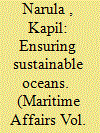|
|
|
Sort Order |
|
|
|
Items / Page
|
|
|
|
|
|
|
| Srl | Item |
| 1 |
ID:
178620


|
|
|
|
|
| Summary/Abstract |
Adjacency, notwithstanding its status as a basis for generating maritime entitlements, has no place as a principle under the existing law of the sea. To endow it with such status in the negotiation of an agreement for the conservation and sustainable use of marine biological diversity in areas beyond national jurisdiction (BBNJ) is likely to upset the delicate balance between the rights of coastal states and those of the international community, which is essential to the widespread acceptance of United Nations Convention on the Law of the Sea (UNCLOS). This article argues that the access regime for marine genetic resources (MGRs) straddling the boundary between areas beyond national jurisdiction (ABNJ) and areas within national jurisdiction (AWNJ) should be location based, and adjacent coastal states should not be accorded preferential rights in the distribution of benefits. However, due regard should be paid to the rights and legitimate interests of adjacent coastal states when transboundary impacts may result from measures adopted for and activities conducted in ABNJ, including those that directly affect MGRs straddling the boundary between ABNJ and AWNJ. At the procedural level, coastal states should be allowed to participate, primarily through prior notification and consultation, in the adoption of area-based management tools (ABMTs) in ABNJ and the conduct of environmental impact assessment (EIA) with respect to activities therein.
|
|
|
|
|
|
|
|
|
|
|
|
|
|
|
|
| 2 |
ID:
139598


|
|
|
|
|
| Summary/Abstract |
Ensuring sustainable oceans and seas is vital for the well-being of the planet. However, oceans – which are the largest ecosystems – are degrading rapidly, which is a cause of anxiety. The paper presents some of the growing concerns about the health of the oceans and analyses three main drivers of ocean degradation, viz. overexploitation for resources, unintended impacts of anthropogenic activities and weak governance structures. Some of the ongoing work on adopting Sustainable Development Goals (SDGs) for the oceans, and by the Biodiversity Beyond National Jurisdiction (BBNJ) working group for governance of the “high seas”, are then discussed. The paper suggests a way ahead and proposes that India should play a larger role in the ongoing discussions. The paper concludes that there is a need for international cooperation and global support, and ensuring sustainable oceans is the key to sustainable development.
|
|
|
|
|
|
|
|
|
|
|
|
|
|
|
|
| 3 |
ID:
139599


|
|
|
|
|
| Summary/Abstract |
States are facing new challenges with respect to conservation and sustainable use of marine biological diversity in areas beyond national jurisdiction (BBNJ). This underscores a significant gap in the existing legal regime, as embodied in the 1982 United Nations Convention on the Law of the Sea (UNCLOS), for protection of marine biological diversity beyond national jurisdiction. Thus, there is a critical need for a legal instrument to specifically address the regulatory and governance gap in this area. To this end, the United Nations General Assembly (UNGA) has set up an ad-hoc BBNJ Working Group. In January 2015, the BBNJ Working Group recommended that an international legally binding instrument under UNCLOS needed to be developed. This will enable UNGA to decide in its forthcoming 69th Session, in 2015, whether or not to launch negotiations for a new Implementing Agreement under the UNCLOS on the conservation and sustainable use of the marine biological diversity in areas beyond national jurisdiction. The details and contours of the new legal instrument, however, have yet to be agreed to, by the international community. It is suggested that international community may consider the precedent of the United Nations Fish Stock Agreement (UNFSA) for taking the next steps in devising a legal instrument. Further, there is also a need to consider an institutional arrangement to address existing BBNJ governance gaps.
|
|
|
|
|
|
|
|
|
|
|
|
|
|
|
|
|
|
|
|
|